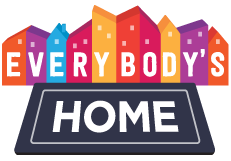Social housing cannot be overlooked during women’s safety summit
More than 240 organisations working at the coalface of domestic violence and homelessness have signed ajoint statement calling for a commitment to safe and affordable social housing from today’s National Women’s Safety Summit.
Housing only has a fleeting reference in the agenda, despite the fact 7,690 women return to perpetrators of violence each year because they have nowhere to live. And an alarming 9,120 women a year become homeless after leaving their homes due to domestic and family violence and being unable to secure long term housing.
Signatories to the statement include large advocacy and peak organisations such as ACOSS, Shelter and the ACTU, through to women’s refuges, homelessness services and community legal centres.
In addition to the joint statement, Everybody’s Home, the national campaign against homelessness, is convening a special online event focusing on the importance of housing and women’s safety. The event begins at 08:15 and can be accessed here.
Everybody’s Home spokesperson, Kate Colvin said housing was absolutely central to women’s safety.
“You simply can’t talk about women’s safety without talking about safe and affordable homes. Women and children in danger need a safe haven and it is incumbent on the Commonwealth Government to address this crisis.”
In Australia each year 39,000 people come to homelessness services seeking long term housing after experiencing domestic and family violence. Of those, 37,867 miss out on long term housing.
“Thousands of women across Australia are currently having to choose between staying in a violent home and homelessness. That is unacceptable,” Ms Colvin said.
Everybody’s Home is calling on the Federal Government to set a target to end homelessness for women and children fleeing violence, an investment to deliver an adequate supply of new social and affordable housing for women and children fleeing violence, and better social security, to protect women and children from poverty and homelessness.
“Without further funding for social housing and an improvement in social security payments, the Federal Government cannot begin to address domestic violence in an adequate way. We need those changes to be made urgently,” Ms Colvin said.
Economic modelling by Equity Economics released in July revealed If the Commonwealth Government invested in 16,800 additional social housing units for women escaping violence, the $7.6 billion cost would be dwarfed by immediate economic benefits of $15.3 billion and the creation of 47,000 new jobs. It found the additional social housing would generate savings of $122.5 million in a year due to women not returning to a violent partner and a further $257 million in a year in savings due to women not experiencing homelessness after leaving their homes due to family and domestic violence.
The Housing and Women’s Safety Summit starts at 8.15am on Monday 6 September, right before the start of the National Women’s Safety Summit.
Speakers include:
Kate Colvin, National Spokesperson, Everybody’s Home
Dr Kyllie Cripps, Palawa woman, Scientia Fellow and Senior Lecturer in the Faculty of Law and Justice at UNSW Sydney
Dr Angela Jackson, Lead Economist, Equity Economics
Video message from Senator the Hon Anne Ruston, Minister for Families and Social Services and Minister for Women’s Safety
The Hon Linda Burney MP, Shadow Minister for Families and Social Services and Shadow Minister for Indigenous Australians
Tania Farha, CEO, Domestic Violence Victoria (DV Vic) and Domestic Violence Resource Centre Victoria (DVRCV)
Dr Cassandra Goldie, CEO, ACOSS
Talie Star, a consumer advocate with experience of homelessness and domestic/family violence
